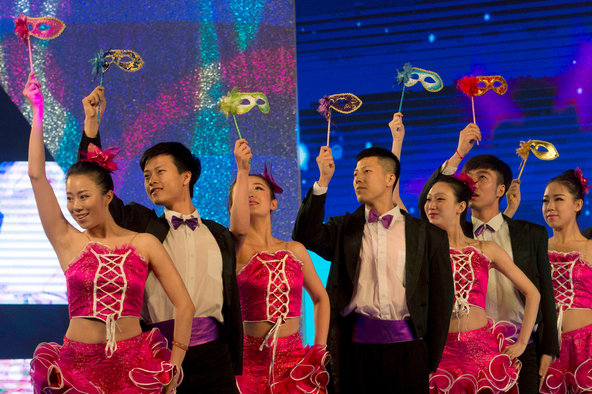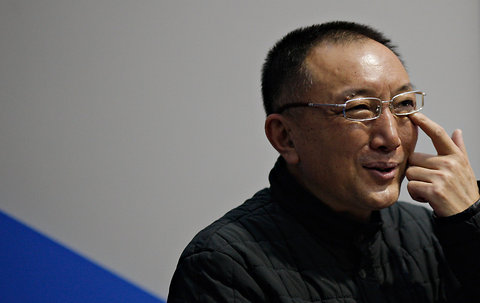 Ng Han Guan/Associated PressDancers performing at a Dalian Wanda Group event in Beijing on Wednesday.
Ng Han Guan/Associated PressDancers performing at a Dalian Wanda Group event in Beijing on Wednesday.
7:55 a.m. | Updated
HONG KONG – When it was launched on the Huangpu River in Shanghai in July 2010 with its mirrored windows, Jacuzzi-fitted deck and a price tag of more than $10 million, the Wanda 2 — a customized version of the Predator 108 featured in the 2006 James Bond film “Casino Royale” — was described by its British builder as the “biggest, most expensive and most luxurious private yacht in the history of yachting in China.”
Now, the owner of the Wanda 2, Wang Jianlin, the billionaire chairman of the privately held Dalian Wanda Group, is betting there are others out there who are ready to one-up him.
On Wednesday, Mr. Wang’s company, which last year bought the American cinema chain AMC Entertainment for $2.6 billion, said it would invest £1 billion ($1.6 billion) to acquire Sunseeker International, the British yacht maker that built the Wanda 2, and to build a luxury hotel in London.
Dalian Wanda said it would pay £320 million for a 91.8 percent stake in Sunseeker, based in Dorset, England, with the remaining stake to be acquired by Sunseeker management.
“Sunseeker is well-placed to take full advantage of opportunities in China, one of the world’s fastest-growing luxury yacht markets,” Mr. Wang said in a news release. “Acquiring Sunseeker deepens Wanda’s international influence, further enhances our position in the global luxury, entertainment and tourism markets, and represents an important step forward for the overall development of our business.”
Before 2006, total overseas acquisitions by Chinese companies never topped $10 billion a year. But in the past five years, companies from China have gone on a shopping spree, spending $40 billion to $70 billion annually on foreign targets, according to Thomson Reuters data.
More often than not, these deals have focused on securing resources like oil, natural gas and minerals to fuel economic growth back home, or gaining control of advanced technologies and know-how to help Chinese companies move up the global value chain.
Those remain important drivers, but more recently, China’s overseas purchases have focused on domestic demand — companies are seeking the cachet of a foreign brand to help increase their market share and pricing power in the race to woo the increasingly powerful Chinese consumer.
André Loesekrug-Pietri, chairman and managing partner of A Capital China Outbound Fund, a Brussels-based private equity fund, saw this come into play last month. Club Med, the French resort operator, received a $700 million buyout offer led by its two largest shareholders, an investment unit of the French insurer AXA and a Chinese conglomerate called Fosun International. Mr. Loesekrug-Pietri said he had helped bring Fosun in as a minority investor in Club Med in 2010, and the buyout bid brought things full circle.
In a separate deal last year, his fund made a strategic investment alongside a Chinese company in Bang Olufsen, a Danish brand of high-end audiovisual equipment.
“It’s not only happening in luxury, but the easiest part of the consumer play is to go for brands that are already extremely well known in China by those who can afford to buy them,” Mr. Loesekrug-Pietri said.
In that sense, he likens Dalian Wanda’s deal for Sunseeker to the $4.7 billion bid for Smithfield Foods, America’s biggest pork producer, that Shuanghui International began last month. Mr. Loesekrug-Pietri said the Chinese company’s profit margins should benefit from being newly able to price its product at a premium in China, appealing to foreign branding and perceived higher quality of imports. Zhejiang Geely Holding Group’s $1.5 billion acquisition of Volvo from Ford Motor in 2010 followed a similar basic logic, he added.
But compared with pork or cars, luxury yachts are considerably more novel in China.
Dalian Wanda’s purchase of Sunseeker comes after the investment last year by the Shandong Heavy Industry Group, also known as the Weichai Group, of a total of 374 million euros ($500 million) – including an equity investment of 178 million euros and debt financing of 196 million euros – to acquire a 75 percent stake in the Italian yacht maker Ferretti Group.
Both Chinese companies are banking on growth in a new market that is highly sensitive to economic volatility.
Yacht industry executives say that today there are close to 30 high-quality marinas in China, and the country is on pace to roughly double that number over the next three to five years.
Gordon Hui, managing director of the regional distributor Sunseeker Asia, based in Hong Kong, said that of the estimated 200 yachts they have sold in the last 10 years, about 25 have gone to buyers in mainland China. Foreign-branded yachts must compete for buyers against two dozen or so local Chinese yacht brands, and rely on quality and brand to command a price premium.
“I think boating culture is really taking off in China,” Mr. Hui said. “But it’s like cars — you get what you pay for.”
In addition to the Sunseeker deal, Dalian Wanda announced a separate agreement to invest £700 million in building a luxury Wanda Hotel on the South Bank in London, the company’s first hotel outside China. The site, covering 105,000 square meters, or 1.1 million square feet, and with views of the Thames, Westminster Palace and Battersea Power Station, will include a 20,000-square-meter, 160-room hotel as well as 63,000 square meters of upscale apartments.
Puji Capital served as financial adviser to Dalian Wanda on the Sunseeker acquisition. Ernst Young was also an adviser, and Freshfields Bruckhaus Deringer acted as legal counsel.
Article source: http://dealbook.nytimes.com/2013/06/19/dalian-wanda-of-china-to-spend-1-6-billion-on-yacht-maker-and-london-hotel/?partner=rss&emc=rss
